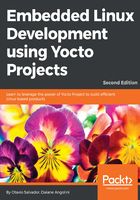
Knowing the local.conf file
When we initialize a build environment, it creates a file called build/conf/local.conf, which is a powerful tool that can configure almost every aspect of the build process. We can set the machine we are building for, the toolchain host architecture to be used for a custom cross-toolchain, optimize options for maximum build time reduction, and so on. The comments inside the build/conf/local.conf file are a very good documentation and reference of possible variables, and their defaults. The minimal set of variables that we probably want to change from the default is the following:
MACHINE ??= "qemux86"
The MACHINE variable is where we determine the target machine we wish to build for. At the time of writing this book, Poky supports the following machines in its reference BSP:
- beaglebone: This is BeagleBone, that is the reference platform for 32-bit ARM
- genericx86: This is a generic support for 32-bit x86-based machines
- genericx86-64: This is a generic support for 64-bit x86-based machines
- mpc8315e-rdb: This is an NXP MPC8315 PowerPC reference platform
- edgerouter: This is EdgeRouter Lite, that is the reference platform for 64-bit MIPS
The machines are made available by a layer called meta-yocto-bsp. Besides these machines, OpenEmbedded-Core also provides support for the following:
- qemuarm: This is the QEMU ARM emulation
- qemuarm64: This is the QEMU ARM64 emulation
- qemumips: This is the QEMU MIPS emulation
- qemumips64: This is the QEMU MIPS64 emulation
- qemuppc: This is the QEMU PowerPC emulation
- qemux86-64: This is the QEMU x86-64 emulation
- qemux86: This is the QEMU x86 emulation
Other machines are supported through extra BSP layers and these are available from several vendors. The process of using an extra BSP layer is shown in Chapter 10, Exploring External Layers.
There are several variables which can be set inside the build/conf/local.conf file. It is worth taking some time and reading the generated file comments to get a general idea.